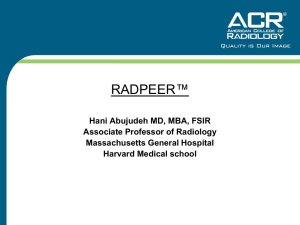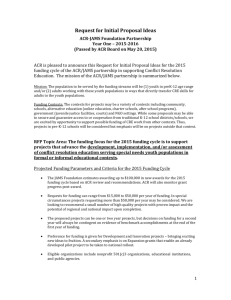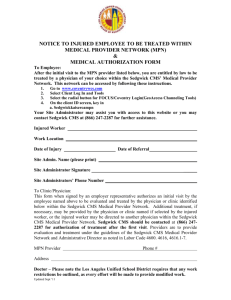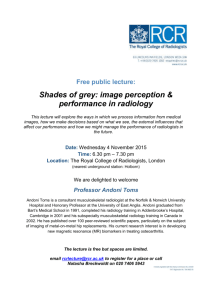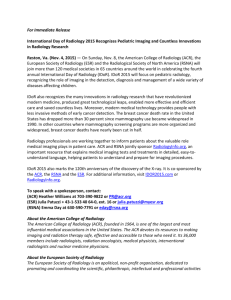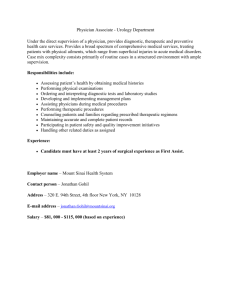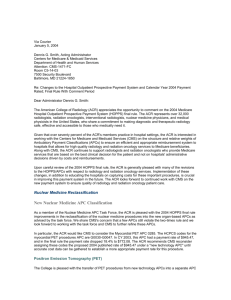(ACR) comments - American College of Radiology
advertisement
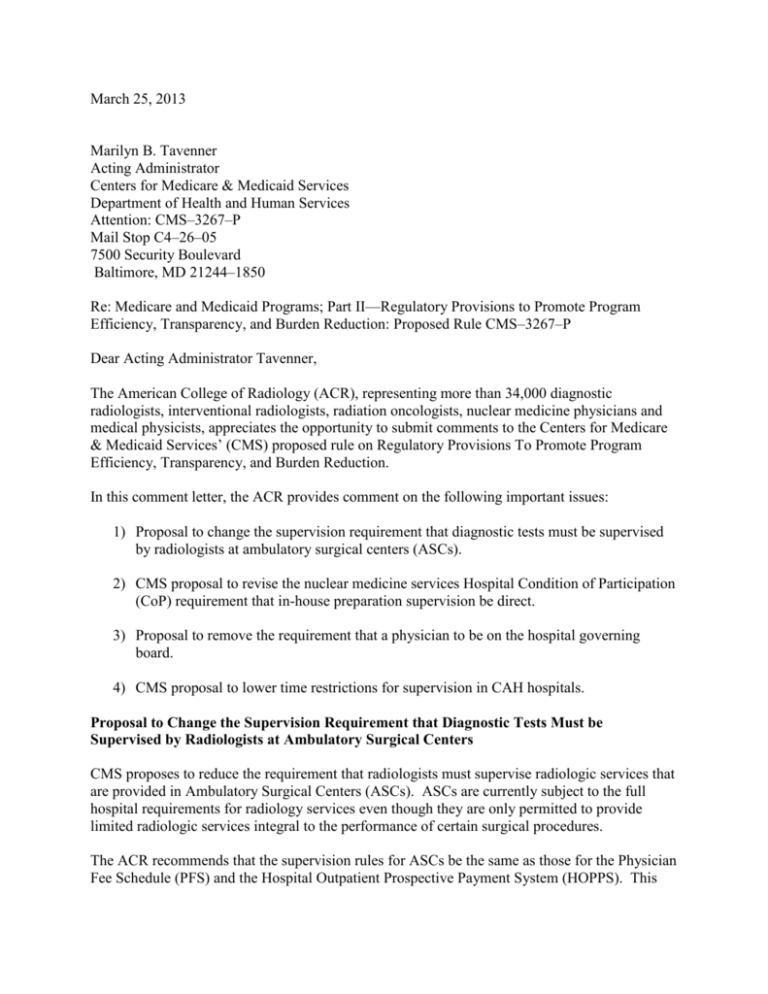
March 25, 2013 Marilyn B. Tavenner Acting Administrator Centers for Medicare & Medicaid Services Department of Health and Human Services Attention: CMS–3267–P Mail Stop C4–26–05 7500 Security Boulevard Baltimore, MD 21244–1850 Re: Medicare and Medicaid Programs; Part II—Regulatory Provisions to Promote Program Efficiency, Transparency, and Burden Reduction: Proposed Rule CMS–3267–P Dear Acting Administrator Tavenner, The American College of Radiology (ACR), representing more than 34,000 diagnostic radiologists, interventional radiologists, radiation oncologists, nuclear medicine physicians and medical physicists, appreciates the opportunity to submit comments to the Centers for Medicare & Medicaid Services’ (CMS) proposed rule on Regulatory Provisions To Promote Program Efficiency, Transparency, and Burden Reduction. In this comment letter, the ACR provides comment on the following important issues: 1) Proposal to change the supervision requirement that diagnostic tests must be supervised by radiologists at ambulatory surgical centers (ASCs). 2) CMS proposal to revise the nuclear medicine services Hospital Condition of Participation (CoP) requirement that in-house preparation supervision be direct. 3) Proposal to remove the requirement that a physician to be on the hospital governing board. 4) CMS proposal to lower time restrictions for supervision in CAH hospitals. Proposal to Change the Supervision Requirement that Diagnostic Tests Must be Supervised by Radiologists at Ambulatory Surgical Centers CMS proposes to reduce the requirement that radiologists must supervise radiologic services that are provided in Ambulatory Surgical Centers (ASCs). ASCs are currently subject to the full hospital requirements for radiology services even though they are only permitted to provide limited radiologic services integral to the performance of certain surgical procedures. The ACR recommends that the supervision rules for ASCs be the same as those for the Physician Fee Schedule (PFS) and the Hospital Outpatient Prospective Payment System (HOPPS). This policy change would allow for radiology studies to be performed under general, direct and personal supervision as defined in §§ 410.32(b) (3) (i) through (b) (3) (iii) by a physician who is knowledgeable in these studies. This would allow for the physician who is providing a radiology service (e.g. ultrasound guidance) to supervise when integral to the service provided (e.g. needle placement). There are many radiology groups who want to and have contractual relationships with ASCs. Radiologists are the specialists who are the most knowledgeable and educated in the performance and interpretation of radiology studies and these arrangements should be allowed and encouraged. When the modalities of CT, MR and nuclear medicine studies are done in ASCs, it is the radiologists’ expertise to know appropriate test selection and protocoling to insure the right kind of study is performed (i.e. with or without contrast). Their supervision also affects the quality of the image taken and thus the quality of the interpretation. The ACR believes that application of the supervision rules to all three settings (PFS, HOPPS and ASCs) is the most direct and consistent way to address the issues raised in this proposed rule. Proposal to Revise the Nuclear Medicine Services Hospital Condition of Participation Requirement that In-house Preparation Supervision be Direct CMS proposes to revise the nuclear medicine services condition of participation (CoP) to remove the modifier ‘‘direct’’ from the in-house preparation supervision requirement. The presence of a pharmacist, MD, or DO would no longer be required during the delivery of off-hour nuclear medicine tests. The ACR supports the recommendations made by the Society of Nuclear Medicine and Molecular Imaging and thus CMS’ proposal. Proposal to Remove the Requirement that a Physician to be on the Hospital Governing Board CMS is proposing to add a new provision to the ‘‘medical staff’’ standard of the governing body CoP. This new provision would require a hospital’s governing body to directly consult at least periodically throughout the calendar year or fiscal year with the individual responsible for the organized medical staff of the hospital, or his or her designee. CMS is also proposing to remove the requirement for a medical staff member, or members, to be on a hospital’s governing body. Although the ACR supports continued communication between the hospital governing board and medical staff, the ACR strongly opposes the proposal to remove the requirement that a medical staff member(s) be on a hospital governing board. Given the changes in the health care landscape with the development of accountable care organizations (ACOs), a rising number of hospital-employed physicians, etc., it is now more important than ever that physicians have a seat at the governing board level. Physician involvement in healthcare management is critical to a hospital’s success in the future. The ACR is aware of many radiologists who have participated on hospital governing boards. They do so to have a voice, provide input and often on their own personal time and expenses. As more and more members of hospital boards come from outside clinical medicine they often appreciate a physician explaining some of the issues, like decisions about new technology and what some of their decisions mean to patients and patient management. With the creation of ACOs and integrated health systems, physicians at the table are advocates for patients and provide valuable guidance to non-clinical board members. Proposal to Lower Time Restrictions for Supervision in CAH Hospitals CMS proposes to revise the CAH and RHC/FQHC regulations to eliminate the requirement that a physician must be onsite at least once in every 2-week period. The ACR supports the CMS proposal to remove the specific time-defined period in which a physician must be onsite. The ACR agree that the physician should have the discretion to be onsite at intervals that they feel are appropriate to meet the needs of the hospital and the department for which they supervise. This very well may occur on a more frequent basis or around or after the period previously defined. Conclusion Thank you for the opportunity to comment on the Proposed Rule. If you have any questions about our comments please feel free to contact Pam Kassing at 800-227-5463 ext. 4544 or via email at pkassing@acr.org. Respectfully Submitted, Harvey L. Neiman, MD, FACR Chief Executive Officer Cc: Lauren Oviatt, CMS Geradine McGinty, MD, MBA, ACR Zeke Silva, MD, ACR

